
OBJECTIVE OF PUSH: Have the most points when the draw pile runs out of cards
NUMBER OF PLAYERS: 2 – 6 players
CONTENTS: 120 cards & 1 die
TYPE OF GAME: Push Your Luck Card Game
AUDIENCE: Ages 8+
INTRODUCTION OF PUSH
Push is a push your luck card game published by Ravensburger. In this game, players create columns of unique cards by drawing off the top of the deck. Cards can continue to be added to columns as long as there is not already a card with that number or color in it. When a player decides to stop, they can choose a column to collect. Be careful! If a player pushes too far and draws a card that cannot be added to a column, they bust and cannot collect any cards.
CONTENTS
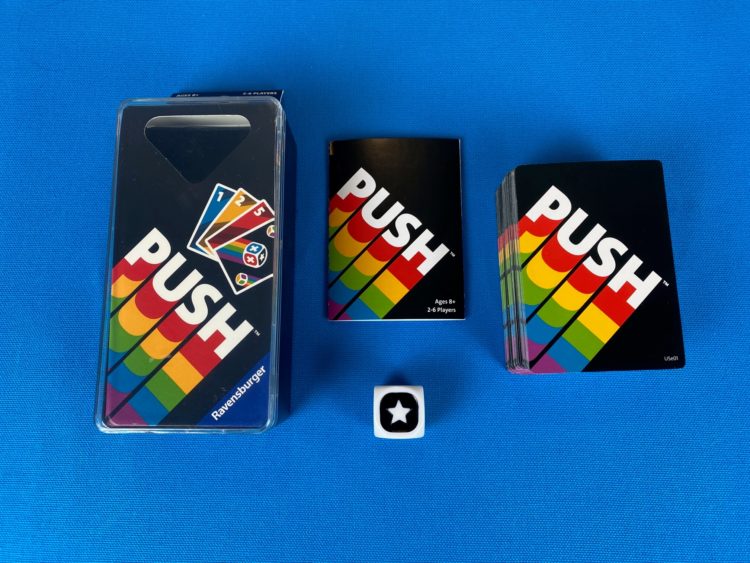
Within the 120 card deck, there are five different colored suits: red, blue, green, yellow, & purple. Each suit has 18 cards that are ranked 1 – 6. There are three copies of each card in the suit. The 18 roll cards will cause players to roll the die and discard points from their card collection. Also, there are 12 switch cards that change the direction of column collection during play.
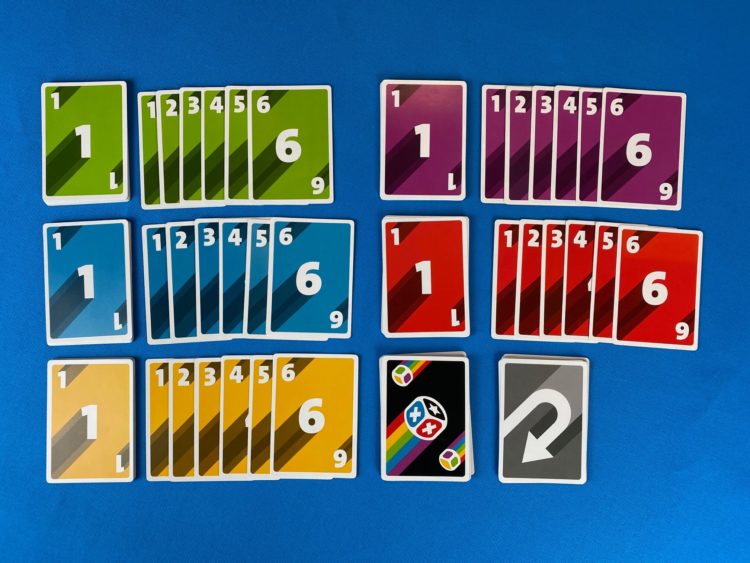
SETUP
Shuffle the deck of 120 cards and place it face down in the center of the table as a draw pile. Put the die near the draw pile within reach of all the players. For a two player game, remove the switch cards from the deck.
THE PLAY
Determine who will go first. During a player’s turn, they have two choices: push or bank.
PUSH
If a player chooses to push, they begin drawing cards from the top of the draw pile. Cards are drawn one at a time and placed in a column. Only three columns can be formed, and players do not have to make three. They can make one or two.
As cards are drawn, they cannot be placed in a column that already has a card with the same number or the same color. A player can add as many cards to a single column as they want without breaking that rule.
Players should keep in mind that while they are drawing cards and creating columns, they are trying not to push too far. Also, the player taking their turn might collect one of the columns for potential points. The other columns will be collected by opponents.
At any time, a player can choose to stop drawing cards. After stopping, it is time for players to collect the columns and add cards to their bench.
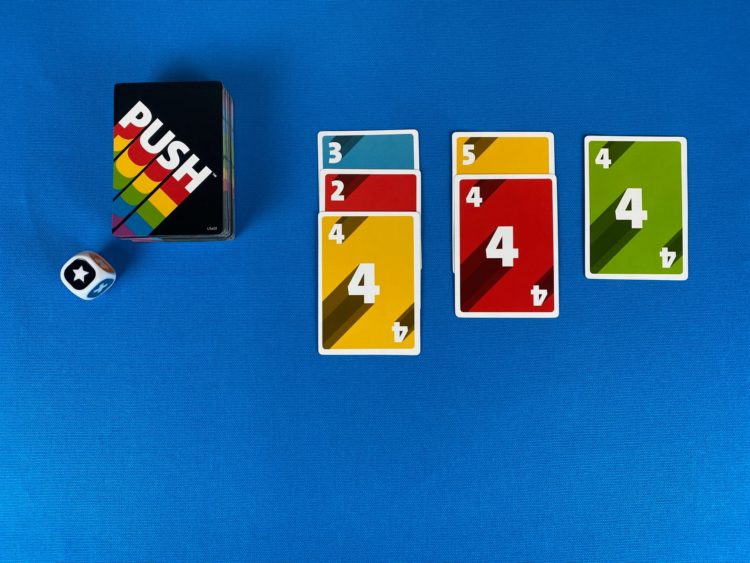
BENCHING CARDS
When a player stops, that player chooses one column to collect and add to their bench. Benched cards are arranged by color face up in front of the player who collected them. Make sure benched cards are staggered so the number can be seen.
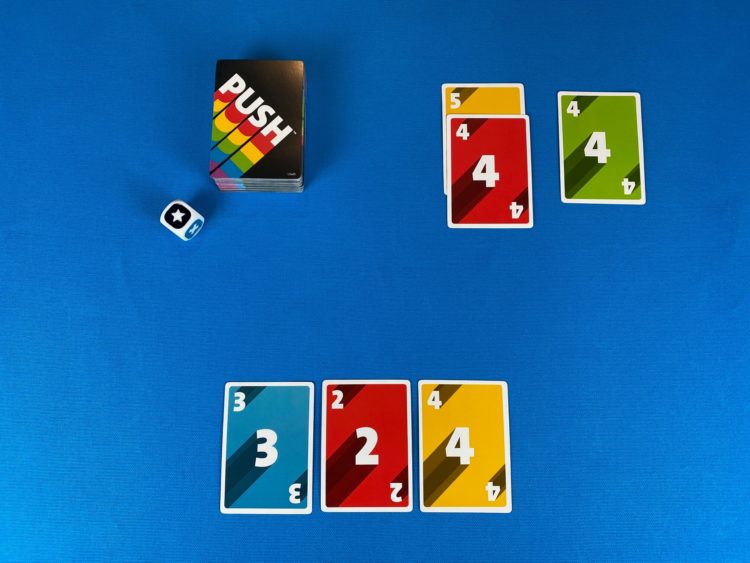
Benched cards can potentially earn points for the player at the end of the game, but they are not safe.
After the player taking their turn has benched a column of cards, any remaining columns are collected by opponents. Starting with the player left of the one taking their turn, that player chooses one of the remaining columns. Continuing left, the next player takes the third column if there is one. These cards are also benched by the player who collected them. Any columns remaining after play returns to the original player are discarded.
The game begins with the benching process happening in clockwise order. Throughout the game, switch cards might be drawn. When a switch card is drawn, it is placed on its own pile near the draw pile. Benching occurs according to the direction on the top most switch card when the player has stopped drawing.
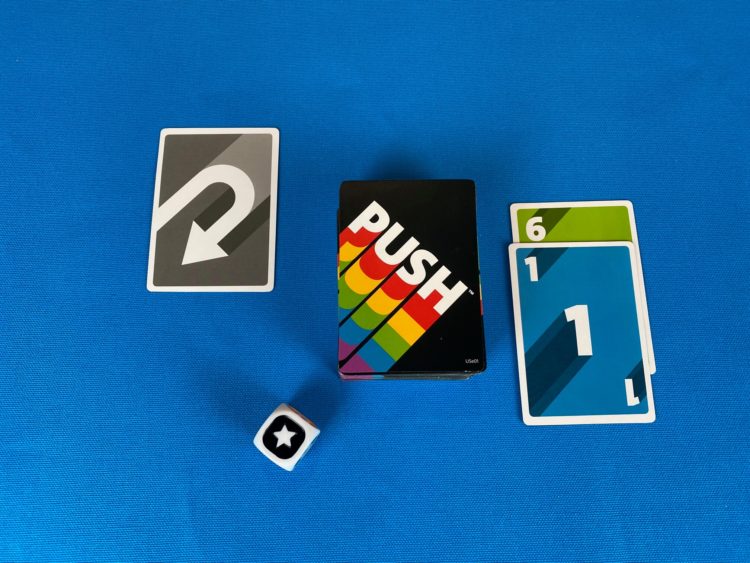
PUSH TOO FAR
If a player draws a card that cannot be used in one of the column spaces, the player has pushed too far. That card is placed in the discard pile. Now, the player must roll the die and discard all cards of the color rolled from their bench. Banked cards are safe and do not get discarded. When a player pushes too far, they do not get to bench any cards.
The other players still collect columns as normal. Any columns that are remaining when it gets back to the player who pushed too far are discarded.
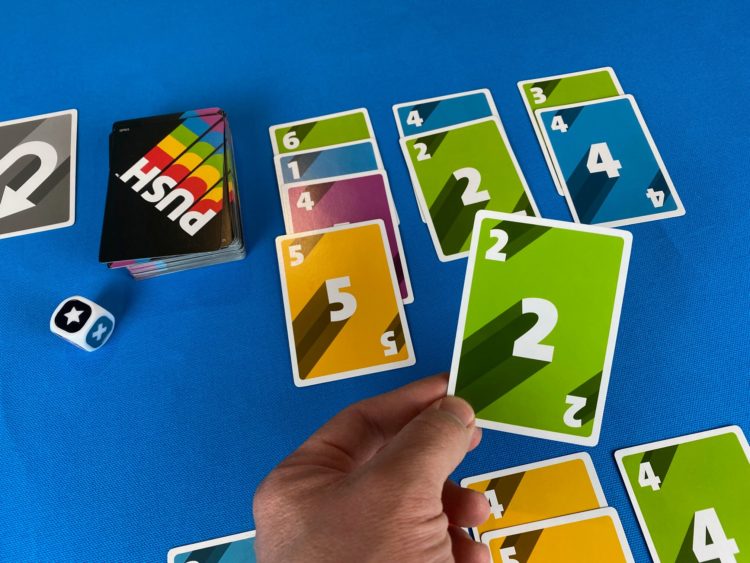
ROLL CARDS
When a player draws a roll card during their turn, it can be placed in any column that does not have one already. If a roll card is drawn, and it cannot be placed in a column, that player has pushed too far. The roll card is discarded, and the player must roll the die.
During the benching phase, if a player collects a column that has a roll card in it, they roll the die. Any cards that match the color rolled are discarded (even cards that were just collected). If a star is rolled, the player is safe and does not have to discard any cards. The roll card is then discarded as well.
BANKING CARDS
On a player’s turn, they can choose to bank cards rather than draw and build columns. If a player chooses to bank, they pick one color and remove all cards of that color from their bench. Colors can be chosen multiple times during the game. Those cards are placed face down in a pile called the bank. These cards are safe and cannot be removed. The player will earn points for these cards at the end of the game.
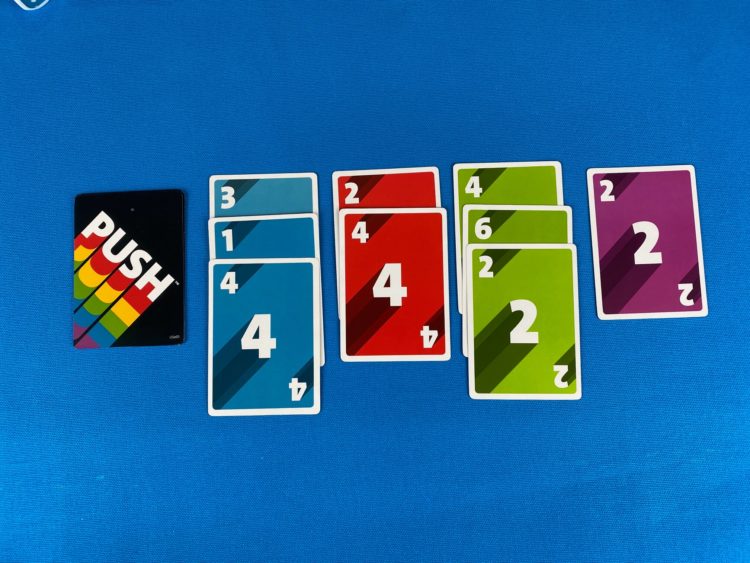
Play continues in a clockwise direction until all of the draw pile cards are gone, and the final columns are collected or discarded. At this point, it’s time to tally up the score.
SCORING
Players earn points for all of the cards in their bench and their bank.
WINNING
The player with the most points wins the game.
MORE DIFFICULTY
For a greater challenge, discard all cards from the bench when a star is rolled.
- TRIPLE SNAKES - February 15, 2021